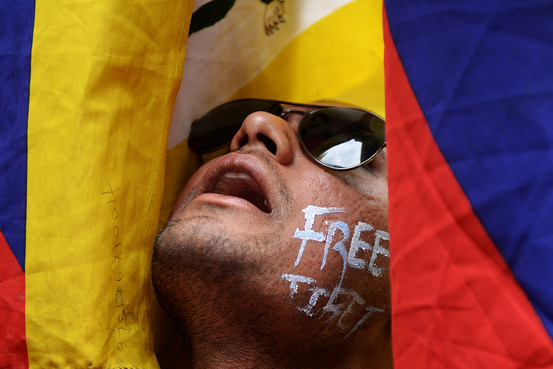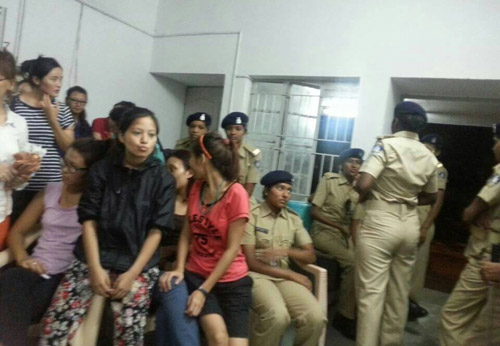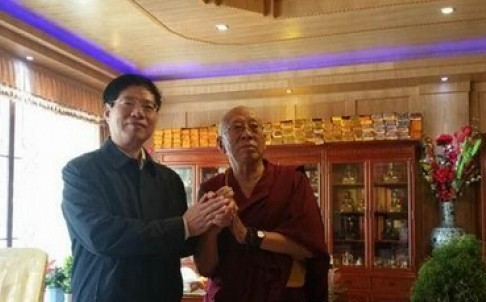Tibetans in India Protest Chinese President’s Visit
Jesse Pesta, The Wall Street Journal | September 17, 2014
For New Delhi’s Tibetan community–one of the largest in the world outside of Tibet—Wednesday is a big day.
China’s President Xi Jinping begins a visit to India and is expected to promise billions of dollars in investment in industry, infrastructure and maybe even bullet trains. During past visits of Chinese officials, Indian police have prevented Tibetans from protesting against China’s control of Tibet, which Beijing claims as part of its territory.

Sajjad Hussain/Agence France-Presse/Getty Images
On Wednesday morning, Indian television network NDTV showed footage of what it described as a group of protesters near the Chinese embassy in New Delhi being escorted away by police while shouting anti-China slogans. At New Delhi’s main Tibetan neighborhood, Majnu Ka Tilla, activist groups reported increased police presence.
A spokesman for the Delhi police, Rajan Bhagat, said that, “Based on our past experience and inputs, we have tightened security in the capital to ensure the Chinese premier’s visit goes on smoothly.” As of shortly after noon on Wednesday, no arrests had been made, he said, adding that security had been tightened “all across the city.”
The Tibetan Youth Congress, an organization calling for Tibetan independence, last week dispatched a letter to India’s new Prime Minister Narendra Modi, urging him to raise the Tibet issue with Mr. Xi. “We believe that a lasting peace and security for India along her Himalayan borders lies only in a free Tibet,” the letter said in part.
India and China have been deeply wary neighbors for decades. The two share a lengthy, militarized border and occasionally skirmish over territorial disputes. Just this week, Indian authorities said Chinese soldiers disrupted construction of a canal in the Himalayan region of Ladakh.
TYC’s president, Tenzig Jigme, expressed cautious optimism that the new Indian government of Mr. Modi, elected a few months ago, will take up the Tibet issue. The reason: Mr. Modi has been “very firm, very adamant on issues of Indian security,” Mr. Jigme said.
Top representatives of the Indian government have publicly referred to China’s “expansionist” policies and to border-security issues in general, he pointed out, although they “have not directly said ‘Tibet.’”
Mr. Jigme said on Tuesday that while he hoped Indian police would let a march take place on Wednesday, he admitted he wasn’t “optimistic.”
India has a long and complex Tibetan relationship. When China’s military pushed into Tibet a half-century ago, thousands of people — including the spiritual leader of Tibetan Buddhism, the Dalai Lama — fled to India, which welcomed them. This has long been a thorn in China’s side.
Another activist group, Students For a Free Tibet, this week staged a small protest at India Gate, a memorial and landmark in the heart of the capital, New Delhi. A half-dozen protesters unfurled a banner that read “Tibet’s Independence, India’s Security.”
The group also sent a petition to Mr. Modi. “I strongly urge you to speak about the crisis in Tibet with President Xi, thereby asserting India’s firm belief in protecting freedom not just in its own territory, but in neighbouring lands as well,” the petition says.
Sitting in a Dunkin Donuts in New Delhi this week discussing her group’s hopes for the meeting with Mr. Xi, the petition’s organizer, Jyotsna Sara George of Students For a Free Tibet, brought up the new Indian government’s focus on border security, as well as its effort to expand India’s role as a regional leader. “To fulfill the new vision, the ultimate thing to do is talk about Tibet,” she said.
–Aditi Malhotra contributed to this report.



